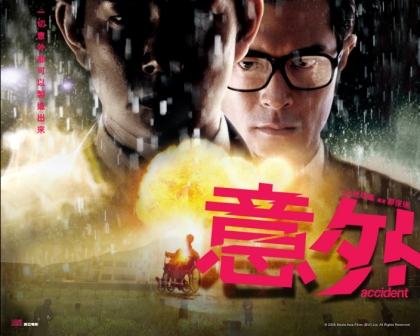April 10th, 2010
Accidents Happen

What if there are no accidents in life? No, I’m not trying to sell you some baloney about “interconnectedness,” “destiny,” or “fate,” but instead using that oft-heard question as a means to articulate the central premise of Soi Cheang’s 2009 thriller, Accident.* If this film is to be believed, there are hitmen out there who rely on some very elaborate, unconventional methods to get the job done. Rather than plugging their intended victims from a great distance using a sniper rifle or tossing them in the nearest body of water, these assassins — led by Louis Koo’s Ho Kwok-Fai, aka “The Brain” — kill people in the most intricate, labyrinthine way imaginable . Their method involves setting up a domino effect in which the victim gets killed in a manner that makes ordinary citizens and the authorities alike think it was just horribly tragic accident, rather than a case of premeditated murder. Clearly, Ho Kwok-Fai and his team are the best there is at what they do. And what they do isn’t very nice.
As professional as they are, even assassins are prone to accidents. Case in point: during the latest routine job, one of Kwok-Fai’s men (Stanley Fung) leaves behind a key piece of evidence that could tie the entire team to the man’s death. What results from this simple accident is a series of events that plunge Kwok-Fai headfirst into a sea of paranoia, as he discovers that he may not be able to trust any of his teammates anymore. Even worse, there may be another “Fixer” on Kwok-Fai’s trail who’s looking to plan a little accident of his own — this time involving Kwok-Fai himself. That enigmatic man in the shadows is played by Richie Ren, who comes across as a slick-dressed urban professional, albeit one who always seems to be nearby. Is his constant presence a coincidence — a so-called “happy accident,” as the saying goes? Or is this guy a cold-blooded assassin, too?
Occasionally, reminiscent of both Francis Ford Coppola’s The Conversation and Alfred Hitchcock’s Rear Window, Soi Cheang’s Accident isn’t quite in the same league, although it is an undeniably well-made, largely absorbing thriller in its own right. For me, the events that make up the majority of the film play out in such a cool, unassuming manner that it made the incredibly over-the-top, completely unconvincing “accidents” a little hard to swallow. If even one little thing goes wrong in the great chain of certain death, then the entire operation must be aborted. While I suppose the same could be true for any “hit,” the sheer amount of time, preparation, and labor that goes into planning and executing these murders seem a tad more involved than a simple bullet to the head would be.
To some degree, I could suspend my disbelief on that matter; however, the real problem I had with the film is the fact that Accident doesn’t quite nail the ending. What happens is telegraphed so early on that I was surprised that the filmmakers actually decided to go on with it. Perhaps if the film had made Koo’s character more convincing and relatable, then the finale would have resonated as a real “Oh no!” moment. Instead, my reaction was more like, “Really? You’re really going to end it like that?”
For those of you who’ve seen Shutter Island (and I won’t spoil it, for those of you who haven’t), you know that the film ends on a somewhat controversial twist. Although I personally didn’t care for it, what was admittedly good about that choice was that it was tonally consistent, explained curious behaviors and acting choices throughout the film, and made it instantly rewatchable (for the willing, anyway). While Accident’s ending is tonally consistent, it’s not nearly as interesting. I know the old adage, “It’s the journey, not the destination,” but for me, the place Accident finally takes you spoils the whole damn trip.
* I keep wanting to call this movie The Accident. Really, it should be called Accidents or even better, Sorry, My Bad! — especially in light of the ending.

